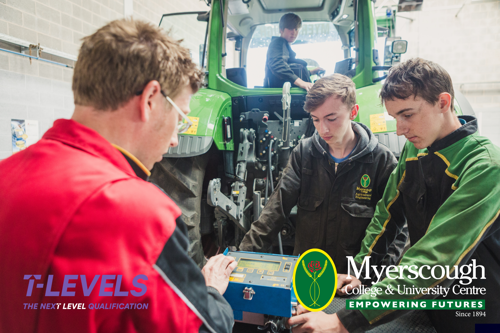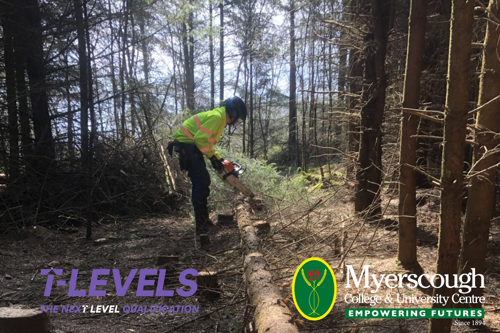
T-Levels Week 2025: Myerscough gets learners industry ready with next level study
Published: Monday 13 October 2025National T-Levels Week 2025 marks a celebration of technical education and its pivotal role in preparing young people for skilled careers.

T-Levels are advanced qualifications developed with employers and educational providers, designed to bridge the gap between classroom learning and workplace experience.
In this article, we place the spotlight on the land-based sector – where at Myerscough we currently offer a diverse and dynamic range of options and rewarding career paths in subjects including animal studies, horticulture, landscaping and arboriculture.
Understanding T-Levels – Key Facts
T-Levels are two-year programmes for students aged 16-19, and are equivalent to three A-levels in terms of UCAS points needed for higher education progression.
They combine classroom theory, practical learning, and a substantial industry placement of typically 45 days, providing a direct route into skilled employment, apprenticeships or further study.
The qualifications are tailored to the demands of modern industry, with input from employers ensuring relevance and employability.
The entry requirements for all T Levels will be a minimum of 5 GCSEs at Grade 4 (including Maths, English Language and Science.)
Study Options in the Land-Based Sector at Myerscough
The land-based sector covers a wide range of disciplines focused on the environment, animals, machinery, and plant life. T-Levels in this sector include a blend of core knowledge and occupational-specific skills, alongside hands-on experience.
Current T-Level programmes available at Myerscough for 2026 entry include:
Land-based Engineering

This T level specialism will prepare you for working with the technology and machinery that keeps modern agriculture running. You will learn a range of vehicle and machinery engineering skills for the agricultural sector, which can also be transferable to other branches of engineering.
Livestock Production OR Animal Management and Behaviour

Students develop a comprehensive understanding of the technical skills and techniques for animal husbandry. You will learn about the breeding, rearing and production of livestock to high standards, and in a way that demonstrates a clear understanding of welfare and safety. It is a popular option for both school leavers and successful Level 2 Technical Certificate students.
Tree and Woodland Management and Maintenance

Students develop a comprehensive understanding of arboriculture, encompassing practical techniques, academic knowledge and technical skills, at our Preston campus, the home of the National Centre for Arboriculture, which houses a purpose built indoor climbing room and chainsaw workshop.
Ornamental and Environmental Horticulture and Landscaping

This programme offers an exciting journey into various occupational specialities within this thriving industry.
As part of the course, you will become familiar with a range of contexts in which horticulturalists work, ensuring you are highly employable at the end of your programme.
The T-Level courses in Agriculture (Livestock) and Animal Welfare currently run alongside the established Level 3 Diploma programmes in Agriculture and Animal Management.
The T Levels in Arboriculture and also Ornamental Horticulture and Landscaping have superseded, improved and replaced the previous City and Guilds Level 3 options.
Careers and Progression Opportunities
The practical nature of T-Levels, combined with industry placements, means graduates are highly valued by employers in the land-based sector.
Many students enter skilled employment directly, while others progress to higher apprenticeships or university courses in related fields. The sector also values entrepreneurial skills, with opportunities to start small businesses in landscaping, horticulture, or animal services.
Typical employers could include farms, animal welfare organisations, veterinary practices, automotive garages, riding schools, garden centres, landscaping firms, and local authorities. There is also growing demand for land-based professionals with expertise in sustainability and environmental management, reflecting the sector’s importance in combatting climate change and promoting biodiversity.
Why Choose a Land-Based T-Level?
- • Strong employment prospects in a sector vital to the UK’s economy and environment.
- • Opportunities to work outdoors and make a tangible difference.
- • Transferable skills in management, science, engineering and design.
- • Access to further study and professional qualifications.
- • Direct input from employers, ensuring qualifications remain relevant and up-to-date.
National T-Levels Week 2025 is the perfect opportunity to explore the breadth of study and career options in the land-based sector. Whether your interests lie with animals, machinery, plants, or outdoor spaces, a T-Level offers a robust foundation for a fulfilling, impactful career.
